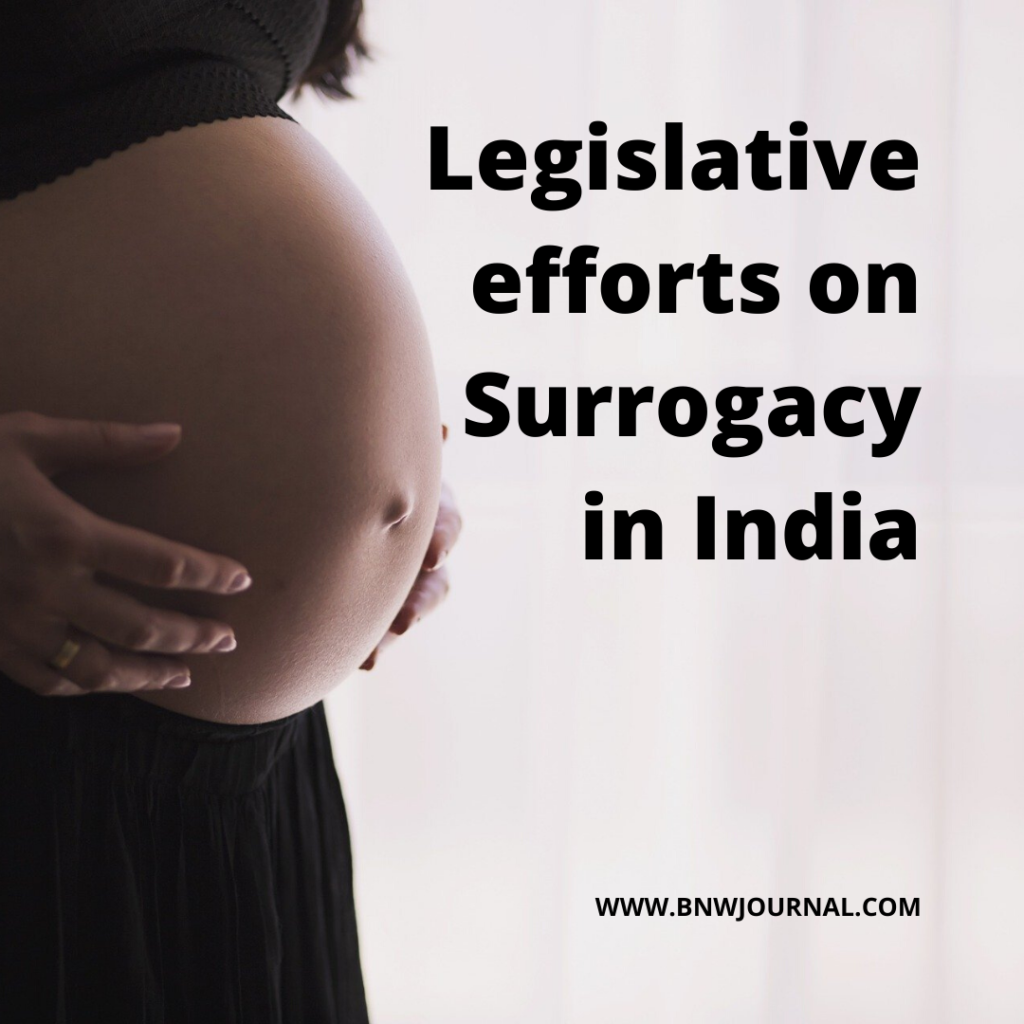![]()
Introduction
India is consider to be a favourable destination for surrogacy for the people living across borders. As surrogacy in India is comparatively less cheap. Though till now various bills have been drafted on surrogacy but surrogacy is prevalent since a very long time. Hence it made India the world capital of surrogacy. Especially at Anand, in Gujarat that provide facilities for surrogacy. Apart from that, taking up the sensitivity involve and the vulnerable parties involve in surrogacy, the Indian government from time to time did make various drafts and bills relating to surrogacy. It tries to strike a legal balance between the legality and morality.

The legislative efforts of the Government made through the Bill are as follows:
ICMR Guidelines
The ICMR guidelines came in the year 2002 formulated by the Indian Council for Medical Research based on surrogacy. Later in 2005, they set out the “National Guidelines for Accreditation, Supervision, and Regulation of ART clinics. It lays down certain rules which the clinics performing Asserted Reproductive Techniques had to follow. Surrogacy seem to be a fruitful practise and is practise widely by the clinics. One could even see an advertisement of such clinics. But the problem arose when foreigners came in India and after successful surrogacy; they failed to take away the baby legally. The guidelines made no restriction for homosexuals or singles to opt for surrogacy. Inspire of the guidelines being non-compulsive yet they follow. They ensure that a contract is made btw the intended mother and the surrogate mother.
These are certain guidelines that were formulate which are
- Apart from the ART clinics, at no other clinic or hospital commercial surrogacy will be undertaken
- If the women are married then the consent of the husband is must
- Any kind of determination of baby sex is not permit
- ART clinics had to arrange for sperms on their own and no male’ friend or relative should give his sperm
- A known woman to the intended parents cannot be a surrogate
- The intended parents are to be the legal parents of the child born
- Selling or taking away embryo outside India is illegal
- The child born has all rights as that of a legitimate one
- Surrogacy should be only for those couples who by no means can have a child due to mental or physical issues
- Human Cloning is not permitted
- The ARTs ask to reimburse the expense on surrogacy with the help the govt or insurance company
Thus these guidelines opened a gateway for various Indian and foreign parents to opt surrogacy. These guidelines were non-statutory. It meant that there was no legal bar that those guidelines have to be compulsively followed. Yet they seemed quite favourable for clinics to adopt.
Assisted Reproductive Technology Regulation Bill, 2008
Until so many years there was no regulation regarding surrogacy. But finally in 2008, after much talks and discussions the government drafted a bill. And came up with legislation regulating surrogacy. The bill took various guidelines from the precious ART guidelines. It prescribe that the contracts related to surrogacy should be made enforceable like other contracts. So that the Indian Contract Act and other acts can be made applicable on surrogacy contracts. The bill had 9 chapters and 50 clauses.
The bill prescribe the terms, regulations, procedure of registration of ART clinics, duties of those clinics, how games, etc are to be store. And also sourced, research, right and duties of the parties involved, offences and penalties etc. It also had a provision for non-residential Indians or foreigner coming to India for surrogacy. They should appoint a local guardian who can take care of the surrogate mother.
The bill makes the intended parents to pay for all the expense incurred in surrogacy. As well as for the surrogate mother. The surrogate had to transfer the right once the child was born. It was further mentioned that the name of the intended parents should be on the birth certificate. The age bracket for the surrogate was kept from 21 years to 45 years. And was not allow to be a surrogate for more than three babies. It also tried to regulate immoral activities practised by those clinics that were into immoral ART.
Criticism of the bill
The bill was criticise on grounds that if focuse more on the clinics to avoid any legal issues that may arise, ignoring the more vulnerable party, the surrogate mother and the child. There was no mention of the surrogate mother’s rights rather it focus more on deciding as who has to be the real parent. No emphasise are made on the procedures adopt in these clinics. Even though it is mention as to whom can opt for the ARTs. But it was not made clear if it cured infertility.
All this criticism leads to a revision of the bill taking suggestion from the Ministry of Law and Justice.
The 228th law commission report on Surrogacy
The law commission plays a very crucial role in the making of the law as intellectuals from the legal field give valuable suggestions. The 2008 case of Baby Manji the SC held that surrogacy was legal while ART Bill, 2008 remained pending. A report submit by the law commission of India title “Need for legislation to regulated Assisted Reproductive Technology Clinics as well as the rights and obligations of parties to surrogacy. It consisted of the following views
- The report favours contacts made between the parties but it should not be made to fulfil commercial surrogacy. The contract should contain all terms and conditions to avoid future problems
- Financial assistance has to give to the baby born through surrogate if his indent parents die or the parents get separate and refuse to take the baby
- The surrogate mother should be cover by the life insurance scheme
- Either the intended mother or the father should be a donor to create a biological bond between the child and the parents unlike in adoption. If in case a single perron is opting for surrogacy he/she has to bear another donor
- No official documents or court permission is require to make the baby legitimate child of the intended parents.
- The birth certificate to hold the name of intended parents
- Complete respect for privacy has to be there
- Sex determination in any stage is prohibit
- Insurance is to be compulsory
The bill discussed other aspects of surrogacy at length. It talked about the moral issues, the social issue of motherhood including foreign case laws. The committee held that the ICMR guidelines were vague. The banning of commercial surrogacy was a major step that this report suggested.
Assisted Reproductive Technology Bill, 2010
The ART Bill has revise again as it remain pending hence later another bill got frame where the Ministry of Health and Family Welfare, Government of India draft the bill along with the following guidelines:
- The age bracket reduce from 45 to 35 years starting from 21 years of age. Also, she should have gone through 5 deliveries that include one of her children.
- The surrogate has to go through a proper medical examination to ensure that the baby doesn’t get infected from some sexual or communicable disease
- The surrogate also has to inform that she has not received blood or related products in 6 months
- Any women can act as a surrogate. Being in the relationship or not being related was no bar but if the woman is a relative of the intended parents then should be of the same generation as that of the intended mother
- Transfer of the embryo restrict to three times of an intending mother and intending father.
- All the parties have to get into a legal contract that would be enforceable
- It had a very important provision for international surrogacy that those coming from outside India had to prove through documents that in their respective country is allowed. This guideline is add when the surrogacy that took place in India dint get citizenship of India nor of Germany after the SC intervened
- The couples coming to India for surrogacy had to appoint a local guardian who will take care of the surrogate mother and if in case the intended parents refuse to take the child, the legal guardian has to be solely responsible.
- As regards to embryo transfer, the bill seeks to prohibit the Commissioning couple to obtain services of more than one Surrogate at a given time; also disallowing simultaneous transfer in the intending mother as well as Surrogate. A woman will be allow to undergo embryo transfer only three times for a couple.
- It stated that the Surrogate Mother will have to enter into a legally enforceable Surrogacy agreement.
- It states that foreigners or NRIs coming to India to rent a womb will have to submit documentation confirming that their country of residence recognizes Surrogacy as legal and that it will give citizenship to the child born through the Surrogacy agreement from an Indian mother. This, perhaps, is in view of the two-year legal battle of the Surrogate sons, Nikolas and Leonard, born to the German couple Jan Balaz and Susan Pohlad. The two kids, born to an Indian Surrogate Mother in January 2008, were render stateless with neither German nor Indian Citizenship. Subsequently, the Supreme Court got them exit permits in May 2010.
- The Foreigner couples are also require to appoint a local guardian who will be legally responsible for taking care of Surrogate until the child is deliver to the Commissioning couple. In case the child is not accept by the couple, it will be the local guardian’s responsibility to take care of the child.
Thus the new bill provides many clear laws making surrogacy contracts legal, and any violation done by the parties was made punishable along with fine and imprisonment.
This bill is appreciat and was consider that its guidelines were clearer but still, some questions were there regarding the rights of surrogates and this lead to a revision of the bill, again.
The Assisted Reproductive Technology Regulation (ART) Bill, 2013
These guidelines are frame by the ICMR but have no legal backing and also were not compulsive. It was observe that the time and an again a new bill introduce. It would have some strong guidelines but it never turned into legislation as some of the other lucane or faults would creep up in the bill somehow, even after so many years. The 2013 Bill had guidelines referring to ART and was quite lengthy with 100 sections in it. Unlike previous Bill, this bill is not send favour any public review of for suggestion from NGOs, doctors etc. And to was said that the government was rushing into it.
The guidelines of the bill were as follows:
- The number of times a woman can be a surrogate is prescribe
- The amount of compensation to be given
- Again the age of surrogate is discuss
- Guidelines which the foreigner had to follow for opting surrogacy in India
- Regulations relating to health standards of surrogate
Later when the bill got public it was far and wide criticize by the NGOs and other organizations stating that not enough provision for women who have to go through IVF was made nor for the child so born. The medical aspects of surrogacy are ignore and no strict regulation was their on the private players involve in surrogacy.
After all the criticism gain the bill is revise in 2014 and another very distinct aspect was add into the bill which gain the maximum attention was that Surrogacy is allow only for those couples who were medically unfit to procreate a child and no foreigners can undertake surrogacy in India. Exceptions were NRIs, OCIs, and PIOs. This was to avoid the exploitation of women surrogates undertaking surrogacy to earn big money. Though the Draft bill remained pending.
Surrogacy Regulation Bill, 2014
After much chaos and anticipation, another bill introduce by the MP, Dr Kirit Premjibhai Solanki on 8th November 2014. She introduce the bill at the individual level and is not initiate by the parliament.
Some features of the bill are:
- The was especially on surrogacy had dealt with it only
- Assisted Reproductive Technology was not include in the bill
- Changing the previous guideline, it made commercial surrogacy legal also for foreigner unless they appoint a local guardian in India
- Insurance had to be paid for the surrogate mother by intended parents
- Surrogacy to be made legal for homosexuals
Surrogacy Regulation Bill, 2018
The bill aimed towards prohibition all sorts of commercial surrogacy allowing altruistic surrogacy. Hence more than the medical expense or insurance money have to pay to the surrogate.
- It also had certain criteria for the intended parents as well as for the surrogate mother. Intended parents had to get two certificates, certificate of essentiality and certificate of eligibility
- The surrogate had to be close relative or friend of the couple and should behave at least one child.
- The age of surrogate is from 25-35
- In the case of abortion, only the permission of surrogate mother and the authorities is require.
- Sex determination and storing of embryo etc strictly prohibit
- The surrogacy clinics had to register themselves for undertaking surrogacy.
- The bill had provisions related to fine as a good punishment
Surrogacy Bill 2019
This bill is introduce by Hardwardhan Lok on 15th July. The recent Surrogacy Bill 2019 puts a complete ban on any kind of commercial surrogacy allowing only altruistic surrogacy and only couples suffering from proved medical failures to conceive should be allowed surrogacy. The couples have to be India citizens, being marry for 5 years age group of, 23 to 50 years old for (wife) and 26 to 55 years old for (husband), the couple should not have any living child (except one suffering from fatal diseases or mentally or physically ill). The surrogate faces certain conditions like the intended parents which include her age to be from 21 to 35, she should have already given birth to a child before; she should be physically or mentally fit and should be a near relative of the couple.
National and State Surrogacy boards set to ensure the application of this act. Opting for commercial surrogacy or advertisement of such surrogacy, selling or buying eggs or gametes for surrogacy and neglecting, abusing or manipulating surrogate mothers, all these are to be consider criminal offences imposes a fine of 10 lakh and 10 years of imprisonment. The bill has other crimes mentioned in it. Till Feb 2020 the report is with the select committee.
Landmark Cases On Surrogacy in India
Baby Manji Yamada vs Respondent: Union of India (UOI) and Anr, 2008 (13 ) SCALE 76, 2008 (11 ) JT 150,
A couple from Japan came to India in the year 2007 in order to opt for the procedure of surrogacy. The surrogate mother is arrange and the embryo is implant into the womb. Just a few months before the delivery of a baby the couples divorced and refuse to accept the child. However, later the intended father agreed but the question regarding the citizenship arose. The Japanese govt could not provide a passport ae citizenship was unclear. The indent mother refuse to take the baby. As neither has she given her eggs nor she was pregnant with the child. The intended father came to India and after one year of court visits and hardship, he finally got his child
Jan Bajaj vs Anand Municipality further Union of India vs. Jan Bala, Letters Patent Appeal No. 2151 of 2009
When a German couple who came to India for surrogacy could not take their surrogate twins back to German because Germany didn’t allow surrogacy. In India, the twins don’t get citizenship as they were surrogate babies of a German couple. The mother of the holder who was Indian went it Gujarat HC where Indian Citizenship is grant to the babies on the ground of their mother being an India. The Union got challenge this in SC. And SC held that the couple should be supervised with Inter-Country Adoption under CARA after which Germany agreed to give citizenship to the babies.
Suggestions
As various guidelines have issue from time to time yet some loopholes still exist. Technological advancement should not go beyond the standards of morality and ethics.
New issues relating to surrogacy arises every day the authorities have to brainstorm even more because it involves the interest of not only Indians but also foreign nationalist. One way to improve the situation of surrogacy altogether is that rather than banning commercial surrogacy it should be termed as compensated surrogacy that allows surrogacy and whosoever wants to act as a surrogate can do so. The surrogate should get reasonable payments should be given to her including medical aid. Just like in other counties like the US that allows reasonable payments.
The guidelines issues by law commission where it was said that an agreement is to be there to bear the child after his/her birth by both the intend parents and their family members ensuring they don’t run away from their liability. That agreement should also include that the intended couple to bear all medical and necessary expenses including the insurance claim for a surrogate.
The surrogate mother should have legal counselling to make them aware of the contracts and the surrogacy law itself.
The government should clearly state the actual amount that the surrogate has to be given so that surrogacy doesn’t turn into an ugly business of rented wombs. Laws have to made in accordance with the rapidly changing society as the society is dynamic and faces new challenges now and then.



0 Comments